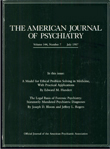Does growing old increase the risk for depression?
Abstract
OBJECTIVE: Most research examining age as a risk factor for depression has been based on cross-sectional data. To investigate the effect of aging on rates of depression prospectively, the authors used two waves of data from a panel study of community residents 50 years old and older. METHOD: Data on symptoms of major depressive episodes were examined for the 1994 and 1995 cohorts of the Alameda County Study. The authors examined age, gender, marital status, education, financial strain, chronic medical conditions, functional impairment, cognitive problems, life events, neighborhood problems, social isolation, and social support. Depression was measured with 12 items covering DSM-IV diagnostic criteria for major depressive episodes. RESULTS: Point prevalence of major depressive episodes was 8.7% in 1994 and 9.0% in 1995. Among the subjects 60 years old and older, there was a tendency toward higher prevalence in 1995. The highest prevalence rates in 1994 and in 1995 were among those 80 years old and older. Subjects who were depressed in 1994 were at greater risk for depression in 1995. When the effects of age and other psychosocial risk factors in 1994 were controlled, there were no significant age effects on depression in 1995. Multivariate analyses demonstrated that the initial age effects were due mainly to chronic health problems and functional impairment. Gender, chronic health conditions, problems with activities of daily living, cognitive problems, neighborhood problems, and social isolation in 1994 all were significant predictors of depression in 1995. CONCLUSIONS: Healthy, normally functioning older adults are at no greater risk for depression than younger adults. What seem to be age- related effects on depression are attributable to physical health problems and related disability.



